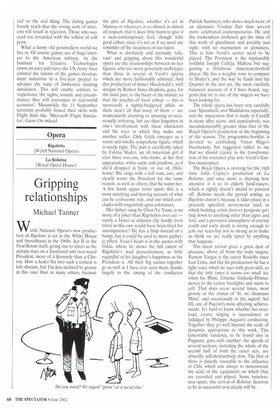Opera
Rigoletto (Welsh National Opera) La Boheme (Royal Opera House)
Gripping relationships
Michael Tanner
Welsh National Opera's new production of Rigoletto is set in the White House and thereabouts in the 1960s, Act 11 in the Oval Room itself, giving rise to titters as the curtain rises on a frustrated and over-sexed President, more of a Kennedy than a Clinton. How a Jester fits into such a context is left obscure, but I'm less inclined to grouse in this case than in many others, because
the plot of Rigoletto, whether it's set in Mantua or wherever, is so absurd in almost all respects that it does little harm to give it a near-contemporary feel; though little good either, since it's not as if we need any reminder of the sleaziness of our rulers.
What is absolutely and eternally 'relevant' and gripping about this wonderful opera are the relationships between its key figures, who are more genuinely archetypes than those in several of Verdi's operas which are more fashionably admired. And this production of James Macdonald's, with designs by Robert Innes Hopkins, goes, for the most part, to the heart of the matter, so that the touches of local colour — this is necessarily a tightly-budgeted affair, so there aren't all that many of them — are momentarily arresting or amusing or occasionally irritating, but are then forgotten in one's involvement with these characters and the ways in which they make one another suffer. Only Gilda emerges as a warm and wholly sympathetic figure, which is surely right. The part is excellently taken by Celena Shafer, an all-American girl if ever there was one, who looks, at her first appearance, white socks and pinafore, as if she'd dropped in from, or out of, Oklahoma! She sings with a full tone, too, and clearly wants the President for the same reason, as well as others, that he wants her. A few harsh upper notes apart, this is a most satisfying and moving account of what can be a tiresome role, and one which concludes with exquisitely spun coloratura.
Her father, sung by Chen-Ye Yuan, is no more of a joker than Rigolettos ever are — surely a Jester as unfunny (he hardly even tries) as this one would have been fired for incompetence? He has a limp instead of a hump, but it could be used to more pathetic effect. Yuan's heart is in the scenes with Gilda, where he shows the full extent of Rigoletto's mad possessiveness, as little regardful of his daughter's happiness as the President is. All their big scenes together go as well as I have ever seen them, thanks largely to the timing of the conductor Patrick Summers, who shows much more of an idiomatic Verdian flair than several more celebrated contemporaries. He and the tremendous orchestra get the tinta of this work of ghastliness and joviality just right, with no mannerism or glossiness. This is how Verdi's scores need to be played. The President is the implausibly youthful Joseph Calleja, Maltese but suggesting a libidinous American-football player. He has a weighty tone to compare to Shafer's, and the way he leads into the Quartet in the last act, the most carefully balanced account of it I have heard, suggests that he is one of the singers we have been looking for.
The whole opera has been very carefully cast, Sparafucile and Maddalena especially, and the impression that it made in Cardiff in scene after scene, and cumulatively, was incommensurably greater than that of the Royal Opera's production at the beginning of the season. The programme-booklet is devoted to celebrating Victor Hugo's bicentenary, but suggested rather to me that we should rejoice in the transformation of his wretched play into Verdi's flawless masterpiece.
The Royal Opera is reviving for the 16th time John Copley's production of La Boheme, and once more is showing how attentive it is to its elderly fund-raisers, which it rightly doesn't intend to pension off. Boheme needs the period setting. as Rigoletto doesn't, because it takes place in a precisely specified never-never land, in which budding artists forever postpone getting down to anything other than japes and love; and a pervasive atmosphere of eternal youth and early death is strong enough to jerk our tears but not so strong as to make us think we are really upset by anything that happens.
This latest revival gives a great deal of pleasure, above all from the male singers. Ramon Vargas is the cutest Rodolfo since Luis Lima, and like his predecessor he has a light voice which he uses with great skill, so that the only times it seems too small are when his Mimi, Cristina Gallardo-Domas, moves to the centre footlights and starts to yell. That does occur several times, most grossly at the climax of 'Si, mi chiamano Mimi,' and occasionally in the superb Act III, one of Puccini's most affecting achievements. It's hard to know whether her overloud, coarse singing is necessitated or indulged by Philippe Auguin's conducting. Together they go well beyond the scale of dynamics appropriate to this work. This lamentable tendency, to be found also in Pappano, goes with another: the speeds of several sections, including the whole of the second half of both the outer acts, are absurdly, self-destructively slow. The first of these is directly traceable to the influence of CDs, which aim always to demonstrate the scale of the equipment on which they are recorded and played. Some tastelessness apart, this revival of Boheme deserves to be as successful as it clearly will be.






















































































 Previous page
Previous page